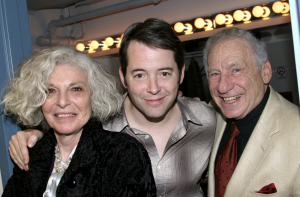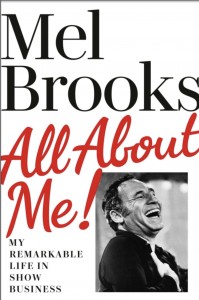“Living this life without her is not easy.”
That is what Mel Brooks has to say about the death of his wife Anne Bancroft in his new memoir.
Read MoreBrooks remained by her side from the day of her diagnosis to the day she passed away.
He is now writing about their legendary romance in his new memoir, All About Me!

In a preview of the book shared by the publisher Penguin Random House ahead of its release on November 30, Brooks writes about his first encounter with Bancroft.
Then a struggling writer, Brooks recalls stalking his future wife for a week until she finally presented him with a request when he claimed the suddenly frequent run-ins must be “kismet” one evening.
"It's not Kismet. You're stalking me! If you wanna see me, why don't you be brave and ask me for a date?" said Bancroft.
“So I did. She said yes, and I saw her almost every night,” writes Brooks.
That was in 1961, and the two would be inseparable for the next 44 years.
They married in 1964 and welcomed their only child together, a son Max, in 1972.
By then, the once-struggling Brooks had become one of Hollywood’s most successful writers, with bonafide hits on screens both small (Get Smart) and large (The Producers). The latter would earn him his lone Academy Award in the category of Best Original Screenplay.
Bancroft earned an Oscar for her work in The Miracle Worker, two Tonys, two Emmys, and a Golden Globe for portraying one of film’s most iconic characters, Mrs. Robinson in The Graduate.
Bancroft continued to work steadily up until the final year of her life, appearing in films such as The Turning Point, Agnes of God, How to Make an American Quilt, Home for the Holidays, and as one of literature’s most iconic characters, Miss Havisham, in the 1999 movie adaptation of Charles Dickens’s Great Expectations starring Gwyneth Paltrow.
Brooks would go on to find the success on Broadway that had long eluded him, winning three Tonys for his direction, production, and writing of The Producers in 2001 and officially becoming an EGOT.
Bancroft was by his side on that historic night.

Related: How Hollywood Icon Sydney Poitier Beat Cancer
She passed away four years later.
Years later, Brooks described working with his wife on To Be Or Not To Be as one of the highlights of his career.
He told Judd Apatow during a 2011 Sirius XM town hall that he loved getting to “hang out for 24 hours” with Bancroft.
“How many people could stand their wives for 24 hours?” said Brooks. “I could cry now. She was easy… she was fun.”
Why Celebrities Keep Cancer Battles Private
Anne Bancroft is just one of the many celebrities who have chosen to keep their cancer battle private.
According to Dr. Renee Exelbert, a licensed psychologist and founding director of The Metamorphosis Center for Psychological and Physical Change in New York, the decision to openly disclose or not disclose one's diagnosis may be made more complicated for someone in the public eye, as they may feel pressure to serve as a role model or to use their notable platform for the greater good.
She previously told SurvivorNet that public figures and celebrities are often held to a harsher standard, frequently scrutinizing their appearance and behaviors. This might make hiding a cancer diagnosis more complex and may also make disclosing a cancer diagnosis a more significant burden to bear. Also, just because someone is a public figure or celebrity does not spare them from judgment and the insensitive comments of others, especially while they may be fighting for their life. She pointed to Chadwick Boseman as an example.
"While privately undergoing cancer treatments, many mocked and criticized him (Boseman) on social media for appearing 'feminine and skinny' and hypothesized that he must be a drug addict," said Exelbert. "Later, many felt cheated by not knowing that he had struggled because they would have wanted to send him support. However, he made the choice about how he wanted to live his life, and that as he created his magic, he wanted his audience to focus on his characters and their important messages, versus his disease."
Why I Won’t Say I Battled Cancer
Uterine Cancer Facts
Uterine cancer, or endometrial cancer, is a cancer that develops in the lining of the uterus.
Several symptoms may indicate that a person has developed cancer of the uterus. Irregular bleeding and bleeding in between periods is often a symptom for pre-menopausal women, while post-menopausal women might experience unexpected bleeding.
"These patients might not be thinking about this. Their primary care providers may not be speaking to them about this," warns Dr. Diana English, a gynecologic oncologist, Stanford Medicine.
There are also several conditions that are common in individuals battling uterine cancer, including:
- Hypertension
- Diabetes
- Polycystic Ovarian Syndrome (which is marked by the absence of regular periods)
- Obesity
- Hyperandrogenism (elevated male sex hormones)
- Lynch Syndrome
Learn more about SurvivorNet's rigorous medical review process.

